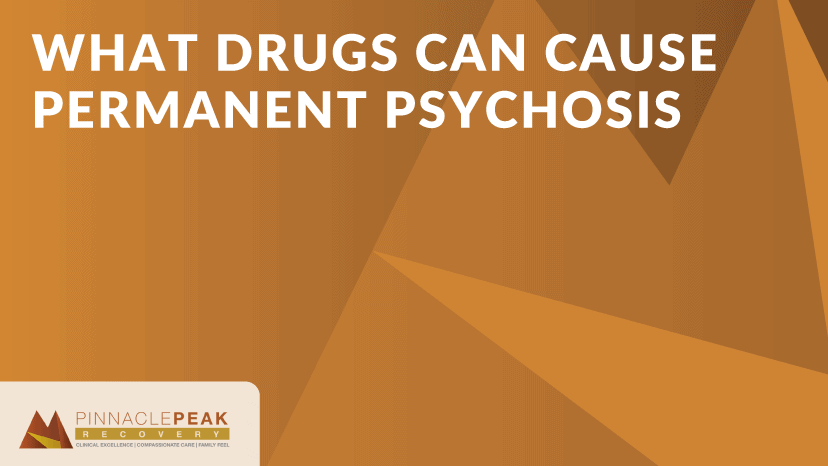You couldn’t quite put your finger on it, but gradually you started noticing a change in your loved one. You couldn’t tell why, or what was causing it, but it’s made you start to pay closer attention to them to see if you can figure out the source.
Then, one day they’re acting very differently than normal. They can’t seem to focus on anything and when they do, they seem to be reacting to or talking to things that you can't see. It's terrifying. Why are they behaving this way? You wrack your brain and wonder if this might be tied to something else. Are they going to be like this forever or is it temporary? What drugs can cause permanent psychosis?
Psychosis can be a scary event for both the person experiencing it, and for anyone around who is there to witness it. One of the best ways to manage psychosis can come from knowledge of both its source and what it does to the person going through it. With a team of master-level therapists here at Pinnacle Peak, we know how to help people who have or are currently experiencing psychosis. Our goal is to help our community so they can know how to react in situations like these in order to take care of themselves or their loved ones properly. Now let's take a further look at drug-induced psychosis.
What Is Drug-Induced Psychosis?
Psychosis is a collection of symptoms that most commonly relate to a person being disconnected from reality. "Drug-induced" psychosis is when these symptoms occur as a result of drug use. This can be just as a side effect of specific drugs or as a result of withdrawal from certain drugs. Alcohol withdrawal, for example, is a common source of drug-induced psychosis.

Spotting the Effects and Symptoms of Drug-Induced Psychosis
What exactly does psychosis look like? How easy is it to spot?
Psychosis doesn't appear suddenly or all at once, there is normally a build-up of symptoms. This can include difficulties sleeping, feeling on edge or restless, increased anxiety and stress, or feelings of fear. If you notice these symptoms, you might be about to experience psychosis.
How Does Psychosis Affect the Brain?
While the exact causation of psychosis is still being studied, we do know that those who have experienced psychosis before are more susceptible to experiencing it again. We also know that those with a predisposition to psychotic disorders are going to be more susceptible to drug-induced psychosis.
What exactly occurs during psychosis?
During psychosis, a person is disconnected from reality to a degree. While their exact level of disconnect can vary, the most common thing is the difficulty distinguishing between what is real and what isn’t.
Some of the most common side effects include:
- Hallucinations - When a person experiences something with one or more of their senses (i.e. smell, sight, hearing, touch, taste) that isn’t actually there.
- Delusions - Where a person has a strong belief that is not commonly held by others around them. The most common delusion is that someone might be out to get them.
How Long Can Drug-Induced Psychosis Last?
The exact time frame for drug-induced psychosis can vary from person to person. Many different factors can impact the length of time that a person experiences psychosis. Some of the primary factors include their history of drug use, other substances in their system at the time, and also their own mental health or mental illnesses.
For example, a person who might be already managing trauma could be more susceptible to psychosis than someone who isn't. Additionally, if a person continues to use the substance that triggered psychosis during their episode, it could elongate how long their psychosis lasts.
The most common time frame for drug-induced psychosis is a few days to a few weeks. Drug-induced psychosis is normally temporary, but if someone is already predisposed to disorders that involve psychosis, those can be triggered by a drug-induced episode.
What Are the Other Risk Factors for Drug-Induced Psychosis?
The primary risk factors that come from psychosis are the potential for harm to yourself or others. The main symptoms of psychosis are delusions and hallucinations. While not in a stable state of mind, you could potentially see or hear something that isn't there and try to react accordingly. A primary example of this is meth mites, where those experiencing hallucinations due to meth use pick at their skin because they think there are bugs on or under it.
Another common risk factor is overdosing. It's not uncommon for a person experiencing drug-induced psychosis to continue to use the substance that triggered it. Because of the altered state of mind, you are at greater risk of taking more than usual and potentially overdosing.

How Can You Recognize Drug-Induced Psychosis in a Loved One?
Psychosis actually has several warning signs before it develops further. These changes are primarily behavioral but can help give you a heads-up for a psychosis episode. Some of these changes and symptoms can include:
- Expressing unease around others
- Withdrawing from people and things they usually enjoy
- Difficulties sleeping
- Increased anxiety
- Lack of motivation
- Being more intense than usual
- Having a lack of feelings
- Difficulties thinking or communicating
- Sudden decline in self-care
The Relation Between Drug-Induced Psychosis and Mental Health
There are many correlations between drug-induced psychosis and mental health -he biggest being how often substance use is utilized as a way to self-regulate the side effects of mental health.
The second biggest correlation is that certain mental illnesses can make a person more susceptible to psychosis, and drug use can increase the chances of psychosis occurring. Some of these mental illnesses include schizophrenia, bipolar disorder, depression, and trauma disorders.
No matter which concern you have, whether it's substance use, psychosis, mental illness, or a combination of the three – treatment options are available to help you or your loved one manage and move on from these conditions. In the case of drug-induced psychosis, the best substance use treatment options will address both the substance use and the psychosis and mental health of the patient in order to help ensure better outcomes. If only one or the other is treated, the odds of long-term success go down drastically, as they influence one another. For example, without treating a person’s mental health concerns, they could return to substance use when their mental health reaches a point where they can’t manage it.
You’re not alone in your experiences, and there are people who are here and ready to help you. Our team at Pinnacle Peak Recovery is well-equipped to guide you on your healing journey. We want to see you reach your recovery goals and we do so by offering a safe environment to recover in. We do our best to see our patients treated to the best of our ability. We want you to feel comfortable and welcome during your recovery, and to feel connected to more than just the process but to those around you.
We offer everything from detox to inpatient and outpatient treatment options. We also integrate family therapy into our treatment program, because we know that substance use can impact more than just the individual. We want you to be able to go home with not only your own healing in mind but the ability to help those you care about most to heal as well.
If you have any questions about our process, our treatment plans, or anything else - don't hesitate to give us a call at 866-377-4761 . Our Pinnacle Peak team is here and ready to help.
Take Charge Of Your Sustance Use Disorder Today!
Call To Talk To One Of Our Specialists !
FAQs
Can drug-induced psychosis be permanent?
Most forms of psychosis are not permanent. While some experiences may last longer than others, with proper treatment and care they can be addressed and resolved, if not managed.
What is permanent psychosis?
“Permanent” psychosis is a long-standing case of psychosis where a person might be experiencing delusions or hallucinations on a regular basis. No psychosis is truly permanent as there are treatments and management plans you can get on with the help of a therapist or psychiatrist to manage psychosis.
Can any medication cause psychosis?
Most medications are not a point of concern when it comes to psychosis. If you have a history of managing psychosis or other similar mental illnesses, you should talk to your doctor in order to help avoid medications that could make it more difficult to manage.

